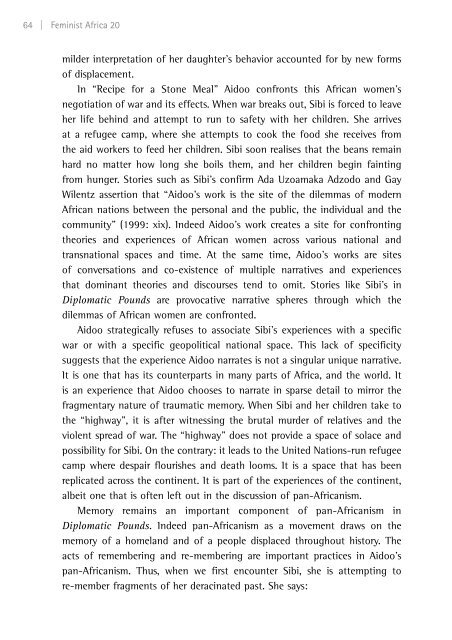You also want an ePaper? Increase the reach of your titles
YUMPU automatically turns print PDFs into web optimized ePapers that Google loves.
64 | Feminist Africa 20<br />
milder interpretation of her daughter’s behavior accounted for by new forms<br />
of displacement.<br />
In “Recipe for a Stone Meal” Aidoo confronts this African women’s<br />
negotiation of war <strong>and</strong> its effects. When war breaks out, Sibi is forced to leave<br />
her life behind <strong>and</strong> attempt to run to safety with her children. She arrives<br />
at a refugee camp, where she attempts to cook the food she receives from<br />
the aid workers to feed her children. Sibi soon realises that the beans remain<br />
hard no matter how long she boils them, <strong>and</strong> her children begin fainting<br />
from hunger. Stories such as Sibi’s confirm Ada Uzoamaka Adzodo <strong>and</strong> Gay<br />
Wilentz assertion that “Aidoo’s work is the site of the dilemmas of modern<br />
African nations between the personal <strong>and</strong> the public, the individual <strong>and</strong> the<br />
community” (1999: xix). Indeed Aidoo’s work creates a site for confronting<br />
theories <strong>and</strong> experiences of African women across various national <strong>and</strong><br />
transnational spaces <strong>and</strong> time. At the same time, Aidoo’s works are sites<br />
of conversations <strong>and</strong> co-existence of multiple narratives <strong>and</strong> experiences<br />
that dominant theories <strong>and</strong> discourses tend to omit. Stories like Sibi’s in<br />
Diplomatic Pounds are provocative narrative spheres through which the<br />
dilemmas of African women are confronted.<br />
Aidoo strategically refuses to associate Sibi’s experiences with a specific<br />
war or with a specific geopolitical national space. This lack of specificity<br />
suggests that the experience Aidoo narrates is not a singular unique narrative.<br />
It is one that has its counterparts in many parts of Africa, <strong>and</strong> the world. It<br />
is an experience that Aidoo chooses to narrate in sparse detail to mirror the<br />
fragmentary nature of traumatic memory. When Sibi <strong>and</strong> her children take to<br />
the “highway”, it is after witnessing the brutal murder of relatives <strong>and</strong> the<br />
violent spread of war. The “highway” does not provide a space of solace <strong>and</strong><br />
possibility for Sibi. On the contrary: it leads to the United Nations-run refugee<br />
camp where despair flourishes <strong>and</strong> death looms. It is a space that has been<br />
replicated across the continent. It is part of the experiences of the continent,<br />
albeit one that is often left out in the discussion of pan-<strong>Africanism</strong>.<br />
Memory remains an important component of pan-<strong>Africanism</strong> in<br />
Diplomatic Pounds. Indeed pan-<strong>Africanism</strong> as a movement draws on the<br />
memory of a homel<strong>and</strong> <strong>and</strong> of a people displaced throughout history. The<br />
acts of remembering <strong>and</strong> re-membering are important practices in Aidoo’s<br />
pan-<strong>Africanism</strong>. Thus, when we first encounter Sibi, she is attempting to<br />
re-member fragments of her deracinated past. She says:


